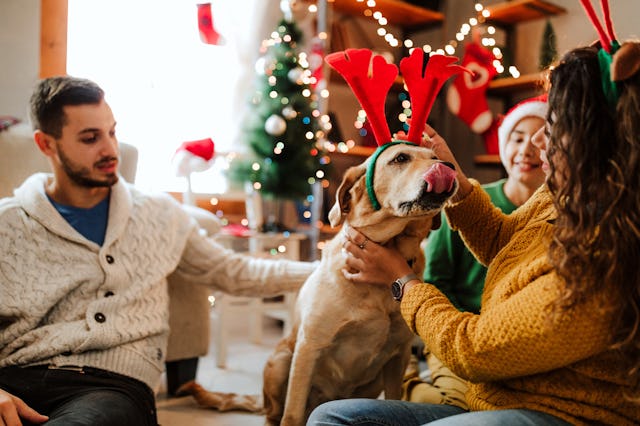Pet Parents, Skip That Essential Oil Diffuser This Holiday Season
Decorating with kids is no easy feat, and it's no picnic with pets, either.

Holiday decorating with kids is no easy feat, and decorating with pets is no picnic, either. Turns out, plenty of your favorite festive decor staples are potentially toxic to cats and dogs, which means you’ll want to proceed with caution as you deck the halls this holiday season.
Whether you’ve got a brand new puppy who joins your toddler in putting everything in their mouth or your cat can’t help but swat at those twinkly lights you so lovingly placed everywhere, keeping the furry members of your family as safe as the human ones can be challenging, as veterinarian Heather Berst, VMD with Zoetis, tells Scary Mommy.
Here’s everything you need to know before you ho-ho-ho your entire home.
The Star of the Show
If the star of the show in your house is a Christmas tree and/or a menorah, you’ll want to be especially mindful, as both can present pet-related challenges aplenty.
If lighting a menorah, you might want to consider one with battery-operated candles to avoid your pet knocking it over and creating an oily mess or accidentally starting a fire — eek!
While small amounts of olive oil are safe for pets to ingest, it’s just not worth the risk overall, says Berst. “You cannot believe how frequently dogs get themselves into trouble by wagging their tail near a lit candle,” she says. “Cats can also jump up and knock them over. So be sure to keep lit candles way out of a pet’s reach. If your pet has asthma or respiratory problems, they should be kept away from burning candles or scented oils as this could make their symptoms worse.”
On that note, infusing your home with some festive scents presents potential hazards for pets, says Berst. “Some types of scented oils such as tea tree, pine, peppermint, cinnamon, citrus, and wintergreen can be toxic for pets if they accidentally ingest them. They can also get burned from knocking into hot oils. It is best to keep the scented oils away from pets and keep the room well-ventilated when burning them if your pet is present.”
As for Christmas trees, you’ll want to check for any potential safety concerns before you make things merry and bright. “There are some concerns to consider with both artificial and real trees,” says Berst. “A dog or cat can eat the needles on real trees, which can cause stomach problems. Cats love to get themselves into trouble by climbing trees. Try to make your tree less accessible to climbing cats by putting a barrier around it or ensuring you have a sturdy base so it doesn’t fall if a cat tries to climb it.” Securing the tree with wire, rope, or heavy nylon from the top or middle to the wall or ceiling might also save your tree from mischievous cats or pups with zoomies.
Ingesting tree water can also cause digestive upset in dogs and cats due to the risk of bacteria or chemical additives, so keeping it covered can help mitigate risk as much as possible. Pet gates or even baby gates can be a lifesaver no matter the type of tree you’re putting up.
Your gorgeous decorations aren’t safe, either.
“Both dogs and cats can eat tinsel and ornaments, which can cause obstructions,” says Berst. “Even more worrisome is chewing on lights,” which can cause electrical shock in pets if ingested. Pet-safe cord protectors and spraying items with a bitter spray can help minimize risk, while sticking to shatterproof ornaments, skipping the tinsel altogether, and avoiding edible decorations (such as popcorn strings) can help deter pets from sniffing their way over to your tree looking for something to nibble on.
Pass on the Poinsettia
Unfortunately, those beautiful seasonal flowers and plants can pose a problem for pets, too. Poinsettia is mildly toxic to cats and dogs, notes Berst. “Other plants that can cause problems are mistletoe, yew, amaryllis, and holly.” She strongly recommends avoiding lilies, especially with cats, as they can cause kidney damage to our feline friends.
For cats, keeping catnip, pet-safe toys, and cat perches nearby can help direct them away from any decorations you’re concerned about, while pups should be trained away from decor and redirected with toys, treats, and positive reinforcement whenever possible.
When to Call the Vet
Still, sh*t happens sometimes, and you’ll want to get your beloved pet medical care ASAP at the first sign of ingestion, says Berst. (Yes, even if it’s on the holiday itself.) Without hesitation, “Call your veterinarian immediately. There are some problems with ingesting holiday items that can be worse the longer you wait, and things you may not think are worrisome that could be serious.”
“If your pet is acting strange and there is any risk that they have ingested something, make the call. Things to watch for include vomiting, not eating, diarrhea, acting dazed or disoriented, salivating more than normal, or acting lethargic. If an animal inhaled something the signs could include coughing, wheezing, and rubbing the face and eyes. Any of those signs should alert you to call your veterinarian right away.”
Though an emergency vet visit will likely come with a hefty price tag, any questions — no matter how big or small — are worth asking. After all, that’s what they’re there for, as Berst reminds us. “Your veterinary team is there to support you and your pet, and they are your best resource to help your pet stay healthy during the holidays and beyond.”
This article was originally published on